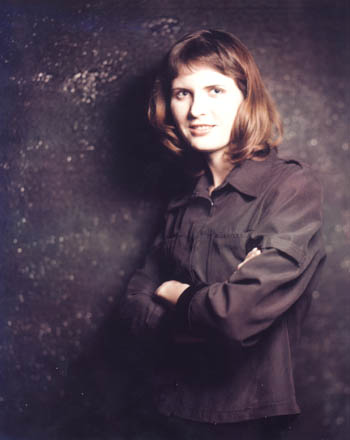Songs of Sunset and Dawn, the new oratorio by Raminta Šerkšnytė for 4 soloists, choir and symphony orchestra based on Rabindranath Tagore’s texts, commissioned by the Vilnius Festival (the premiere is scheduled for the 22nd of June at the National Philharmonic Hall) - is likely to present yet another surprise to the public that has already noted the work of the young composer and is following the development of her style.
|

photo: Modestas Ežerskis |
The oratorio, by the way, is only a very conditional genre definition of Šerkšnytė’s new composition. The composer has mentioned that the very term ‘oratorio’ is slightly repulsive to her - it is associated with overstated expression and monumentality, dramatic, massive sound of choirs and orchestras. Šerkšnytė: “In the Western tradition, even instrumental music has often been somehow committed to telling stories - and I in my new oratorio (even though the genre suggests a certain narrative) no longer want to ‘tell’ anything. I am more interested in expressing the atmospheres, sensations and states inspired by the Tagore’s texts - not actual stories. Besides, I wanted to, possibly following the oriental tradition, create music that would be appropriate for a certain time of the day - evening, night, morning...”
As if following the structural principles of Indian ragas, the first part of the oratorio - Evening - represents the initial improvisatory part and exposition of the main themes, the second - Night - further develops the themes, the third - Morning - is an ecstatic culmination in faster tempo. The Indian tradition is probably also the source of the recurrent, almost infinite drones, alternately produced by different orchestra instruments. According to the composer, since the beginning of this decade, the ‘oriental’ theme is becoming increasingly close to her. A significant example of that is the Oriental Elegy (2002) for string quartet, a surprising stylistic shift. Until then, her work was dominated by the lush neoromantic musical language, expressing the dramas of various psychological states and creating colourful musical landscapes; it all changed into complex (though, quite possibly, even more emotionally effective) musical expression: this score is full of aleatoric moments, extended performance techniques, microtonal motifs and clusters, interchanged with tense rests.
Maybe the new composition could present a certain synthesis of the ‘neoromantic’ and ‘avantgarde’ periods of her work? The composer agrees that certain principles of musical organization, discovered and developed in Oriental Elegy and later works, may be applied to the second part of the Songs - Night, where they will serve to create the atmosphere of darkness and mystery. But the whole composition in general will be a still new Šerkšnytė, than could one expect from her earlier periods and shifts of style. Paradoxically, in her chamber pieces (Vortex for solo violin and large ensemble, 2004; Almond Blossom for nine instruments, 2006) the composer would often make an ensemble sound like a full-scale orchestra. Here the situation is reverse: while having a symphony orchestra, a choir and the soloists at her disposal, she is aiming at the chamberlike, translucent sound - even though she is not giving up her own textural, contrapuntal, timbral refinements. Raminta Šerkšnytė also confesses that in her previous work she found it difficult to avoid dramatic moods, ‘subjective’ emotional outbursts, even while working with such more or less ‘objective’ soundscapes, dedicated to the magnificence of nature, like Mountains in the Mist for symphony orchestra (2005). The new oratorio should be quite different - the drama is replaced by meditation: the composer is now more interested in what is superior to the human being, and not the collisions of the latter’s presentiments, passions and disappointments. For half an hour the audience is invited to dive into a relaxing ritual of sound, experience the pleasure of listening, rare enough in modern works, forget the mundane life and wander into spheres of exalted poetry and music.
In terms of the number of awards and other acknowledgements, Raminta Šerkšnytė is ahead of many older Lithuanian composers (one could mention the two annual awards for the best chamber piece, established by the Lithuanian Composers’ Union - for Oriental Elegy in 2003 and Almond Blossom in 2006, The Golden Cross of the Stage for the best music for Lithuanian theatre performance in 2005, the third prize at the International Rostrum of Composers in Vienna for Vortex in 2005, and the fact that her symphonic composition Mountains in the Mist will be featured in the program of the ISCM / ACL World Music Days 2007 in Hong Kong).
Among her recent works one should mention the commission of this year’s International M. K. Čiurlionis Piano and Organ Competition – Three Ostinato Preludes for piano. Bearing in mind that Raminta Šerkšnytė is also a piano performer and has experience in writing piano music that is attractive to performer, one might expect that this work, featuring some composition principles by the great Lithuanian classical composer Čiurlionis, will find its deserved place in the repertoire of the young talented pianists preparing for this Lithuania’s largest international music competition. Meanwhile, the new oratorio Songs of Sunset and Dawn may become a starting point for the idea that the composer has been toying with among her other innumerable projects for a while already - a chamber opera, which she is going to write while participating in the young artists’ Jerwood Opera Writing Programme (JOWP) at Aldeburgh Music, UK.
© Linas Paulauskis
Lithuanian Music Link No. 14

